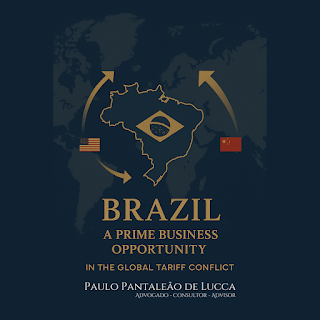🌎 Strategic Opportunities
for Brazil Amid the New Global Trade War
The recent escalation of tariff tensions among major
economies marks the beginning of a new global trade war — with significant
implications for international business. For Brazil, this scenario brings not
only challenges but also a unique opportunity to enhance its strategic role in
global markets.
While many countries have suffered heavy impacts from rising
tariffs, Brazil has faced relatively moderate exposure — around 10% — creating
room for smart positioning across multiple sectors.
1. Growing Demand for Brazilian Agricultural Products
As China restricts imports of U.S. agricultural goods,
Brazilian products — such as soy, meat, and grains — have become increasingly
attractive to Chinese buyers. To seize this momentum, it is essential to
accelerate the certification of more slaughterhouses for export and respond
quickly to growing demand.
2. Brazil as a Hub for Reindustrialization
The current trade environment opens space for Brazil to act
as an intermediary hub for manufacturing and re-exporting goods. Strategic
locations such as the Manaus Free Trade Zone and the Industrial Airport of
Confins can be leveraged to receive goods, perform light processing, and export
them to markets like the U.S.
3. Rare Earths: A Strategic Advantage
China’s restrictions on exporting rare metals have created a
global gap — and Brazil, rich in rare earth elements such as niobium, can
position itself as a key supplier to the tech industry. Attracting investment
in the mining sector will be crucial to capitalizing on this emerging
opportunity.
4. New Openings in E-Commerce Supply Chains
Rising tariffs have disrupted the operations of small-scale
U.S. importers, especially those relying on Chinese dropshipping. Brazilian
entrepreneurs now have a window to offer competitive alternatives, gaining
ground in international e-commerce markets.
5. Trade Settlements in Local Currencies
With reduced Chinese exports to the U.S., there is room for
alternative trade arrangements — such as using local currencies, including a
potential BRICS currency. Part of Brazil’s agribusiness revenue could be
redirected to import Chinese technology, creating a mutually beneficial
economic cycle.
6. Attracting U.S. Investment to Brazil
Despite internal regulatory hurdles, Brazil may become an
attractive destination for foreign investment. U.S. investors looking to
circumvent global tariff constraints may find value in investing in Brazilian
farms and industries, focusing on exports from Brazilian soil. Coordination
between state governments and the private sector can enhance this potential.
7. Brazilian Industry Expanding into the U.S.
For Brazilian companies ready to expand, the trade war opens
a door to internationalization. Establishing manufacturing operations in the
United States can be a strategic move to access the American market with
reduced trade friction.
📢 In Summary:
The global trade war is more than just a geopolitical
standoff — it is also a rare opportunity for emerging economies like Brazil to
gain influence and relevance in global trade.
Companies that move swiftly and with strategic legal
guidance can turn this moment of instability into a major growth accelerator.
Our law firm is ready to assist your business in
identifying and leveraging these opportunities, with secure and well-structured
legal solutions.
Paulo
Pantaleão de Lucca
pantaleaodelucca@gmail.com
Lawyer – Consultant
- Advisor
.png)
Comentários
Postar um comentário